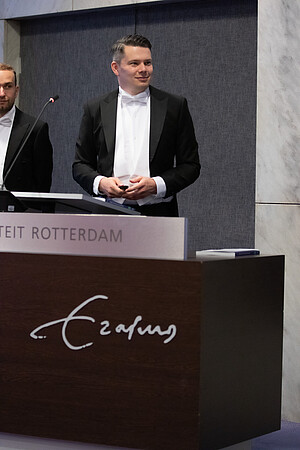PhD Defence Stefan Breet
In his dissertation 'A Network Perspective on Corporate Entrepreneurship: How Workplace Relationships Influence Entrepreneurial Behavior', Stefan Breet developed and tested a theoretical framework that provides a network perspective on corporate entrepreneurship (the NPCE framework). The NPCE framework shows when and why the social context plays a decisive role in the corporate entrepreneurship process. The results of three empirical studies provide support for the NPCE framework and demonstrate that the social context can evoke entrepreneurial and conservative behavior. The key implication of this finding for future corporate entrepreneurship research is that the omission of the social context leads to an incomplete understanding of the corporate entrepreneurship process. Stefan defended his dissertation on Thursday, 30 June 2022 at 13:00. His supervisors were Prof. Justin Jansen (RSM), Dr Lotte Glaser (ECE), and Prof. Jan Dul (RSM). Other members of the Doctoral Committee were Prof. Vareska van de Vrande (RSM), Prof. Joe Labianca (University of Massachusetts Amherst), Prof. Julia Brennecke (University of Potsdam), Prof. Leon Oerlemans (Tilburg University), and Prof. Wouter Stam (VU Amsterdam).
About Stefan Breet

Stefan Breet is an Assistant Professor of Strategy and Entrepreneurship at the Radboud University Nijmegen.
Stefan is fascinated by the paradoxical nature of corporate entrepreneurship. In his research, he examines the social and behavioral antecedents of intrapreneurship and organizational adaptation, as well as the psychological and relational mechanisms that govern these effects. The main goals of his research are to improve our theoretical understanding of corporate entrepreneurship, to integrate research on intrapreneurship with research on social networks, to separate “nice-to-have” from “need-to-have” factors by identifying the necessary conditions that enable or constrain intrapreneurship, and to provide practical recommendations that help both employees and organizations to become more entrepreneurial.
Thesis Abstract

Organizations often struggle to maintain or rekindle an entrepreneurial flair, which makes them vulnerable when circumstances change. Corporate entrepreneurship is a process that stimulates entrepreneurial behavior, enabling organizations to respond to changing circumstances, pursue new opportunities, and secure their long-term viability. Prior research has suggested several models that capture the corporate entrepreneurship process and identify a range of factors that stimulate or stifle entrepreneurial behavior. These models greatly improved our understanding of corporate entrepreneurship, but they do not explicitly acknowledge the social context of organizations and employees. In this dissertation, I develop and test a theoretical framework that provides a network perspective on corporate entrepreneurship (the NPCE framework). The NPCE framework shows when and why the social context plays a decisive role in the corporate entrepreneurship process. The results of three empirical studies provide support for the NPCE framework and demonstrate that the social context can evoke entrepreneurial and conservative behavior. The key implication of this finding for future corporate entrepreneurship research is that the omission of the social context leads to an incomplete understanding of the corporate entrepreneurship process.
View photos of Stefan's PhD Defence
Photos: Elise Ntoremi / Your PhD Photo


